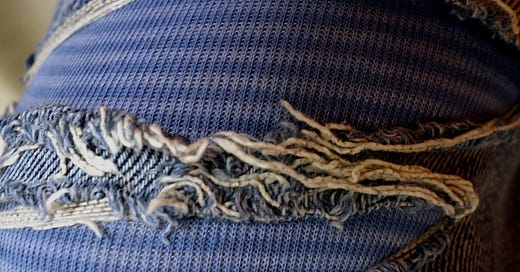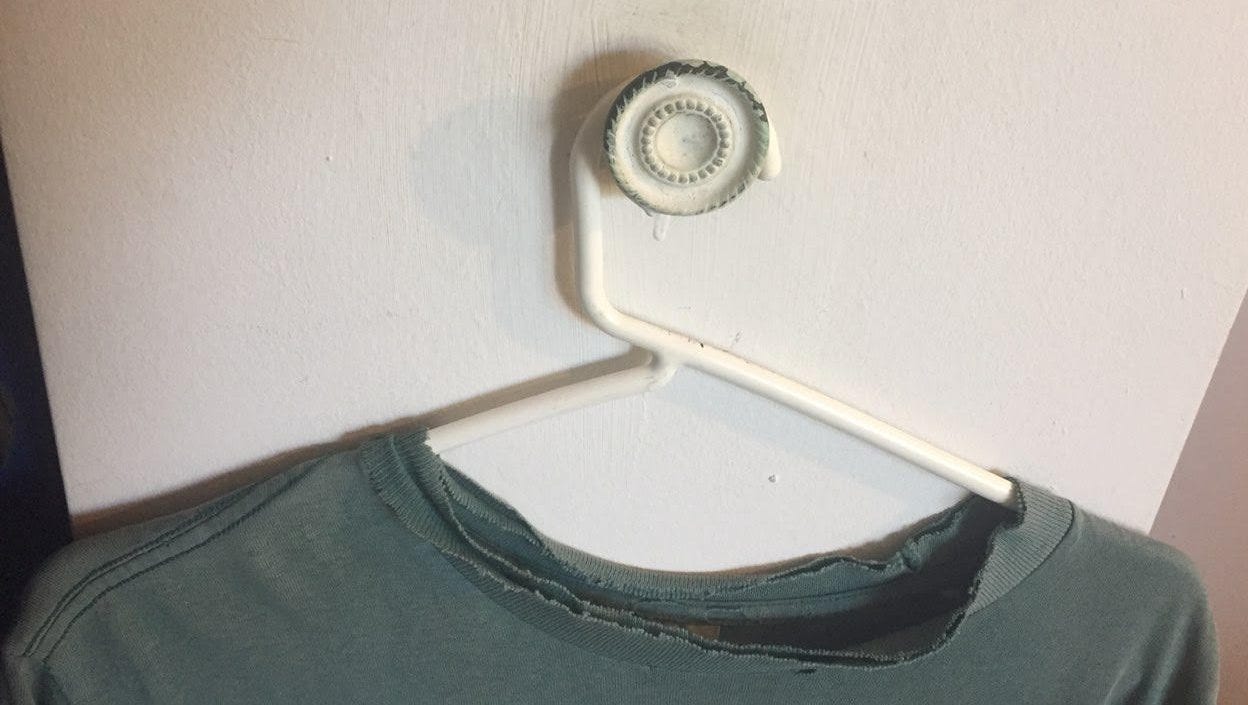The Spectre of Bill and Dodie Franklin: What Friends Conceal. (Money, Part 2)
Poor kids from his High School days were the memories Stephen King needed to look dead-in-the-eye to write his first famous novel. And yet...
This is the second post in my first series on how little we know about the secret corners of others’ lives: money, health, family dynamics, etc. Previous post in the series here.
I’ll write them from a protracted viewpoint—centered on the realm of the personal and relational.
Before George Orwell wrote “1984,” he wrote “Down and Out in Paris and London,” which provides images such as this one:
All the clothes he now had left were one suit, with one shirt, collar and tie, a pair of shoes almost worn out, and a pair of socks, all holes.
…
In spite of all this, Boris managed to keep a fairly smart appearance. He shaved without soap and with a razor-blade two months old, tied his tie so that the holes did not show, and carefully stuffed the soles of his shoes with newspaper. Finally, when he was dressed, he produced an ink-bottle and inked the skin of his ankles where it showed through his socks. You would never have thought, when it was finished, that he had recently been sleeping under the Seine bridges.
This book review of “Down and Out” reflected on that incident—where Orwell was describing a friend preparing for a job hunt.
And it noted that some people who are temporarily hard-up because of hard circumstances “acquired [a great level of skill] in transforming themselves into phantoms of their respectable pasts.”
“Phantoms of their respectable pasts.”
What a thought.
And so sometimes I wonder, when we see someone like this before our eyes, so transformed—so skillfully concealing deprivation and desperation—do we even know what we’re seeing?
There seems to be an assumption that the need to conceal …one’s need… is just a cost of “doing business”—but not just in the business world.
It extends out to all the social interactions of life:
You discover, for instance, the secrecy attaching to poverty. At a sudden stroke you have been reduced to an income of six francs a day. But of course you dare not admit it—you have got to pretend that you are living quite as usual. From the start it tangles you in a net of lies, and even with the lies you can hardly manage it.
…
Your food is bread and margarine, or bread and wine, and even the nature of the food is governed by lies. You have to buy rye bread instead of household bread, because the rye loaves, though dearer, are round and can be smuggled in your pockets. This wastes you a franc a day. Sometimes, to keep up appearances, you have to spend sixty centimes on a drink, and go correspondingly short of food. Your linen gets filthy, and you run out of soap and razor-blades. Your hair wants cutting, and you try to cut it yourself, with such fearful results that you have to go to the barber after all, and spend the equivalent of a day's food. All day you are telling lies, and expensive lies…one could multiply these disasters by the hundred. They are part of the process of being hard up.
Orwell describes one decision, followed by many successive decisions, that land you on a treadmill of deception—which accelerates as time progresses.
(“Oh what a tangled web we weave / When first we practice to deceive.”)
In your attempts to cover up the fact that you don’t have enough money, you spend an inordinate amount of money on a repeated basis.
This logic is an uneasy and wearying thing, and that treadmill seems merciless.
On the other hand, attempting to choose the option “Don’t get on the treadmill” can have some pretty horrifying results.
I’ve recently been shaken by a story that featured such horrifying results.
I discovered it in Stephen King’s “On Writing: A Memoir of the Craft.”
When King set out to write his first famous novel, “Carrie,” he had a great plan for a story, but there was one major obstacle to executing that plan.
King had very little sympathy for Carrie herself—a girl who floundered in helpless passivity when faced with her classmates’ tormenting.
He explained that in order to portray the title character compellingly, King needed to dredge up memories of “the two loneliest, most reviled girls in [his] class—how they looked, how they acted, how they were treated.”
One of these girls was named Dodie Franklin.
She and her brother Bill had it rough:
Dodie and her brother Bill wore the same stuff every day for the first year and a half of high school: black pants and a short-sleeved checked sport shirt for him, a long black skirt, gray knee-socks, and a sleeveless white blouse for her. Some of my readers may not believe I am being literal when I say every day, but those who grew up in country towns during the fifties and sixties will know that I am.
I love that King felt the need to clarify that he did mean that literally.
So unimaginable for so many.
To be fair, I once had a classmate who wore the same thing every day: Red baseball shorts and a white T-shirt for a team that (I assume) he played for in high school.
At one point, someone stated that this fellow did indeed own ten copies of the same items of clothing and was “cycling through” them.
We all collectively breathed a sigh of relief.
However, that was not Bill and Dodie’s situation, and their internment in Lisbon Falls High School went about as badly as you might imagine. (or possibly worse)
Stephen King recounts it like this:
…for children like Dodie and Bill, Lisbon Falls meant ridicule and ruin. We watched in amusement and horror as Bill’s sport shirt faded and began to unravel from the short sleeves up. He replaced a missing button with a paperclip. Tape, carefully colored black with a crayon to match his pants, appeared over a rip behind one knee. Dodie’s sleeveless white blouse began to grow yellow with wear, age, and accumulated sweat-stains… The other girls made fun of her, at first behind her back and then to her face… The girls didn’t just laugh at Dodie; they hated her, too. Dodie was everything they were afraid of.
He also chronicles Dodie’s response in light of these circumstances.
After Christmas vacation, sophomore year, Dodie returned to school remarkably changed—sporting a soft wool sweater, a fashionable cranberry-colored skirt, and curled locks from a home permanent:
Dodie was a girl transformed, and you could see by her face that she knew it.
…[but] mere clothes changed nothing. The teasing that day was worse than ever. Her peers had no intention of letting her out of the box they’d put her in; she was punished for even trying to break free. I had several classes with her… I saw her smile fade, saw the light in her eyes first dim and then go out. By the end of the day she was the girl she’d been before Christmas vacation…
And this story ends the way it began, with minor variations: Dodie went on to wear her new skirt and sweater the next day, and the day after that, and on through the year as they rapidly became no-longer-new. (“Why bother,” I suppose?)
And King closed out the scene noting that Dodie was still wearing that same skirt and sweater in May or June (as the school year closed out), though “by then the weather was much too hot for wool and there were always beads of sweat at her temples and on her upper lip.”
…the teasing had dropped back to its pre-Christmas levels and the taunting stopped entirely. Someone made a break for the fence and had to be knocked down, that was all. Once the escape was foiled and the entire company of prisoners was once more accounted for, life could go back to normal.
I suppose that once we know that such a thing can happen in the real world—in our world—we get cautious.
My minds’-eye surveys all those desperate souls Orwell portrays, dabbing ink on their skin at the places where it might show through holes in socks if they need to look presentable..
…or over-spending to keep up appearances that everything is “fine, really just fine.”
And you know, my first instinct is always to say, “Save that money! There has to be another way! You might be able to take one reputation-surcharge, but the cumulative effect will drag you down!"
But then I think about Bill and Dodie Franklin, and say, “Well, maybe those respectable-façade-chasers were on to something, after all.”
Maybe they knew there was something else to fear beyond want and financial-degradation.
Maybe the spectres of Bill and Dodie Franklin—and others like them—haunt us all.
Click here for: Part 3 (Narratives of Scarcity and Scarcity Itself: What Friends Conceal).
Last week was a break for “Ideas. Imagery. Story.”
I’ll put it down to the 4th of July. (though that’s far from the full story!)
I was originally not planning for a break, then planned for half a week of break... now, I think this newsletter will always take a one-week break for holidays in the future! :)
For my second post this week, I plan to share lots of my fictional vignettes of (and dialogues involving) old women: some concise, some long-winded… some clear and sharp, some less so.
Apparently, this is a favorite subject for me to depict!




